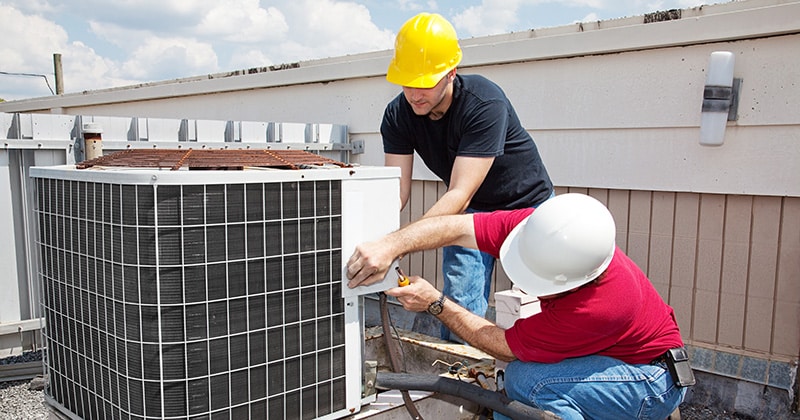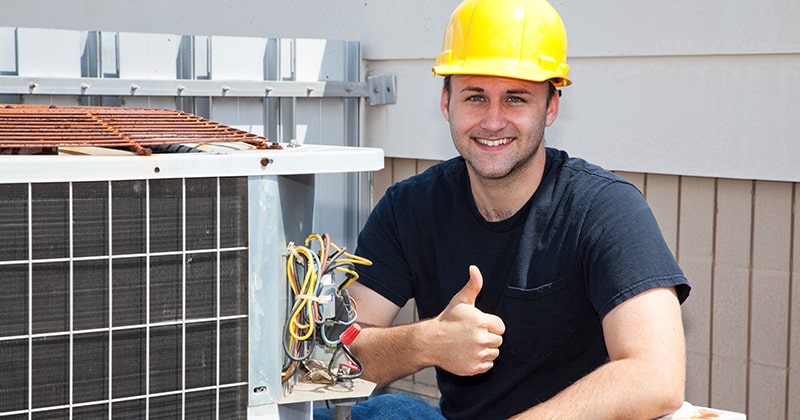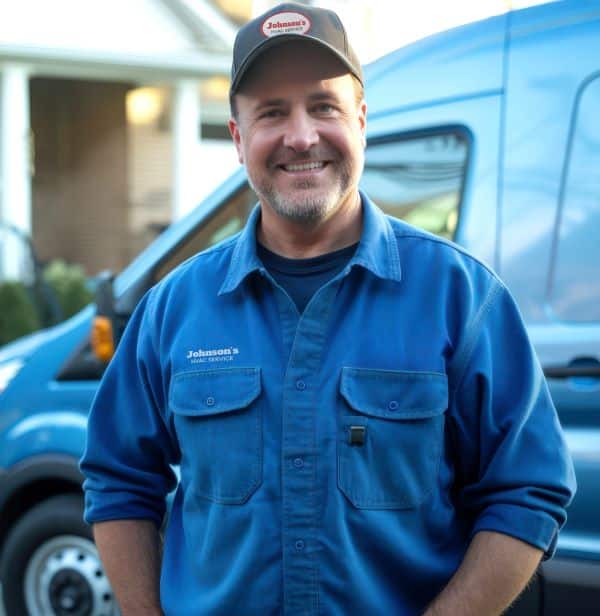The Best HVAC Technician Training Programs in the U.S.
If you enjoy working with your hands and are good at problem-solving, a good HVAC technician training program can lead to a rewarding and prosperous career. It’s not a desk job.

Staff Contributor
It’s a welcome sight when the HVAC technician’s truck arrives on a hot summer’s day after your air conditioning has lost its cool. Or when your heater has had a breakdown in the bleak midwinter. Do you want to be that HVAC hero behind the wheel?
If you enjoy working with your hands and are good at problem-solving, a career in heating, ventilation, air conditioning, and refrigeration (HVACR) is a rewarding and prosperous way to earn a living. You are in the driver’s seat—it’s not a desk job.
In this article, we’ll look at what it takes to become an HVAC technician and what it means to be HVAC Excellence accredited on a national level. We’ll also review some of the best technician training programs in the United States.
What Does an HVACR Tech Do?

The US Bureau of Labor Statistics projects a positive job outlook for HVACR mechanics and installers with solid 5% growth from 2021 through 2031.
So, what, exactly, does an HVACR career entail?
Heating
Keeping a household warm uses more energy and costs more money than any other system in a home, making up about 29% of your utility bill.
The 2020 United States Census discovered that 47.5% of Americans used gas to heat their homes, 39.8% used electricity, and 0.2% used solar energy.
The different types of heating equipment that Americans choose to control their indoor climates—like furnaces, boilers, and heat pumps—all need maintenance by HVAC specialists.
Ventilation
Four basic ventilation systems can maintain the indoor air quality of your house. Each system works best in different parts of the country, depending on the climate of the region. And each system requires installation and maintenance by a ventilation specialist.
- Exhaust system – works by depressurizing your home. Best suited to cold climates.
- Supply system – uses a fan to pressurize your home, forcing outside air into the building. Works best in hot or mixed climates.
- Balanced system – usually uses two fans and two duct systems. Supplies fresh air to rooms where people spend the most time. Appropriate for all climates.
- Energy recovery system – can recover 70 to 80% of energy in exiting air and deliver it to incoming air. Requires more maintenance than other systems. Most cost-effective in climates with extreme winters or summers where fuel costs are high.
Air conditioning
According to the US Energy Information Administration (EIA), nearly 90% of American households use air conditioning. Two-thirds rely on a central AC system to cool their homes.
Air conditioning lets communities flourish year-round in hotter states like Arizona and Florida. Work opportunities for HVAC technicians are abundant.
With AC almost universal in the United States, it may be surprising to learn that the job outlook for a technician is not as optimistic in Europe—fewer than 10% of European homes have air conditioning.
Refrigeration
The “R” in HVACR applies to industrial refrigeration—not the maintenance of a refrigerator in your home. That falls under appliance repair.
In commercial HVACR systems, industrial refrigeration is essential for industries such as food and beverage, pharmaceuticals, and petrochemicals.
While the core principles of refrigeration are the same as air conditioning, the stakes are different. If your AC doesn’t work, it affects your comfort on a human level and doesn’t need an emergency repair.
If a refrigeration system goes down, the chance of losing hundreds of thousands of dollars worth of products is at risk. Refrigeration technicians are on call nights and weekends. Maintenance of refrigeration systems is not generally an entry-level job. The work is demanding and requires patience and resilience.
What Education Do You Need to Become an HVAC Technician?

In general, you need at least a high school diploma or GED to be an HVAC technician. It’s not a job for someone who wants to punch a clock—it requires flexibility and grit.
Because HVACR systems are rapidly becoming more technically complex, an applicant with post-secondary education at a tech school is a big plus. Those who have completed apprenticeships are also in demand. In some states and localities, technicians need licenses.
Technical schools and institutes offer programs that prepare students for a specific trade or career. They can span less than two years for entry-level positions to up to four years for more advanced learning.
Upon completion, graduates earn a degree, diploma, or certificate. Training at a program that is HVAC Excellence accredited can give you an edge.
What Is HVAC Excellence Accreditation?
HVAC Excellence is a not-for-profit organization based in Mount Prospect, Illinois, that was founded in 1994. Back then, heating and cooling technology was rapidly advancing, and technicians needed to stay sharp. The non-profit improved the technical skills of the HVACR workforce by setting quality standards.
Around the same time, school systems throughout the US worried that their tech programs were not keeping pace with the real world.
The Tennessee Board of Regents shared this concern. They ordered that an independent organization conduct a peer review of their HVAC training programs.
What they discovered was even more disturbing—there was no national accreditation agency for the HVACR industry.
They finally encountered HVAC Excellence, which met their benchmarks. The two organizations worked together to establish a set of standards. In 1999, HVAC Excellence launched the industry’s first national accrediting body.
Today, the ESCO Institute manages HVAC Excellence. Its mission is to ensure that the HVACR educational system stays at the top of its game.
An Overview of 7 Training Programs in the US That Are HVAC Excellence Accredited

There are hundreds of HVACR training programs in the US. Located in every state, they offer different levels of education.
By attending a local institution that is accredited on a national level, you know that their HVAC program meets or exceeds top standards. It has the resources and administrative support to train you to work with the pros. You become a valued member of the HVACR workforce.
The right entry-level program can also open doors. It can lead to advanced placement opportunities with major, well-known employers in the HVACR industry.
The ESCO Institute’s extensive peer review has validated all the following training programs. Each has received HVAC Excellence Programmatic Accreditation. The training they offer represents what a solid entry-level program should include:
1. Arkansas State University – Beebe
ASU-Beebe is the oldest two-year institution of higher learning in Arkansas. Its HVACR program focuses on the installation and servicing of central air conditioning and heating systems. It also includes a variety of refrigeration equipment.
The program is diverse and challenging. One day a student learns to install a furnace and ductwork for a new home. Another day they gain the skills to service air conditioning equipment.
You can earn a Certificate of Proficiency, a Technical Certificate, or get an Associate of Applied Science-General Technology degree.
The skills obtained from this program can prepare you for a wide spectrum of jobs, from a semi-skilled worker who performs routine operational and maintenance tasks to a plant superintendent responsible for the operation and maintenance of million-dollar mechanical systems. You will gain a solid foundation for an HVACR career.
2. Cypress College, California
The path to a rewarding, well-paying HVACR career is on your doorstep at Cypress College in Orange County, California. Located just outside of Disneyland Resort and Knott’s Berry Farm, skilled HVACR technicians are always in demand.
The college offers an Air Conditioning and Refrigeration program. The primary emphasis is on preparing you with entry-level job skills.
By earning a Certificate of Achievement, you will gain a strong background in the fundamental skills of refrigeration, electricity, mathematics, communication, and drafting. The program provides you with a solid arsenal of HVACR training to get your foot in the door as an apprentice.
Job opportunities located in the Southern California area are abundant. The skills you learn may allow you to score a position with a high-powered employer in the region.
3. Delgado Community College, New Orleans, Louisiana
Delgado has campuses throughout the New Orleans metropolitan area. Students train to be HVAC technicians in a hands-on lab environment.
The primary mission of Delgado’s HVAC/R program is to prepare students for successful careers. The lucrative goal is to become a business owner or service manager.
The Master HVAC/R Technician program provides the intensive training needed to service any type of HVAC/R equipment. Besides the Master HVAC/R Technical Diploma, a Certificate of Technical Studies as a Certified HVAC Technician is offered.
4. Minneapolis Community & Technical College, Minnesota
Minneapolis College provides hands-on learning to prepare you for a high-paying career in HVACR. Certified instructors deliver the training you need in an industry that is challenging and fun.
The HVACR program is active in SkillsUSA, winning the HVACR competition many times on the State level, with one National winner.
Minneapolis College has a Solar Energy training lab used for Photovoltaic and Thermal solar energy system training. A state-of-the-art Indoor Air Quality and ventilation-training house are within the HVACR lab.
You receive classroom and hands-on instruction in the most advanced HVACR training lab in Minnesota. The equipment and curriculum are continuously updated to reflect industry changes.
Upon successful completion of the program, you will:
- Get section 608 Universal Certification by the EPA for refrigerant transition and recovery
- Interpret electrical concepts, procedures, and safety practices
- Troubleshoot and repair HVACR equipment
- Develop communication skills with customers, co-workers, and employers
- Prove necessary mechanical skills to install, maintain, and repair HVACR equipment
- Demonstrate the skills necessary to become proficient in metal fabrication related to HVACR
5. State Technical College of Missouri
State Tech claims their HVAC training program should stand for “Highly Valued Awesome Career.” The school is located in Linn, just outside of Jefferson City, the capital of Missouri.
You’ll learn how to install, service, and repair all HVAC systems. Included are geothermal ground source heat pumps and variable refrigerant volume systems.
The program has a hands-on approach to ensure that you spend most of your time learning how to work with electrical motors, controls, and wiring. You’ll train how to diagnose and repair them.
There are opportunities for summer internships in the HVAC industry. And the chance to become certified in four HVAC Excellence Employment Readiness areas. You’ll gain invaluable skills needed to step straight out of training and into your career.
6. Central New Mexico Community College, Albuquerque
CNM’s HVACR technology program is based in the tech hub of Albuquerque, New Mexico. It trains you to operate and maintain various types of HVACR equipment and accessories.
In as little as two terms, you can earn a Residential HVAC Certificate of Completion and enter the workforce.
With one more term, you will earn your Commercial & Industrial Certificate of Completion.
If you complete a total of five terms, which takes less than two years as a full-time student, you will receive an Associate of Applied Science degree (AAS).
7. Virginia Beach Technical and Career Education Center, Virginia
Where the Chesapeake Bay meets the Atlantic Ocean. The Technical & Career Education Center in Virginia Beach offers a two-year course in a lab with real equipment. You’ll learn the theory and practical applications of air conditioning, refrigeration, and heating equipment servicing.
The course covers safety, soldering, brazing, piping, electrical circuits, central air units, window units, ice makers, refrigerators, oil and gas furnaces, and heat pumps.
Students prepare for the following credentials or certifications:
- Environmental Protection Agency (EPA) Examinations – Levels I, II, & III, Core, and Universal
- R410A Reclamation Safety Certification
- HVAC Excellence Examinations – Electricity, Basic Refrigeration & Charging, and Air Conditioning
- Workplace Readiness Skills for the Commonwealth Examination
Where It All Begins

A career in HVACR can be vastly rewarding if you are a mechanically minded person who enjoys freedom. You need friendliness, talent, patience, and troubleshooting skills to succeed.
Every day brings new challenges and encounters with people who have HVACR issues. And you can earn a career without the financial burden and time requirements that attending a four-year university entails.
Find a Training Program: First Steps
In addition to the training programs we’ve highlighted, the ESCO Group has compiled an extensive directory of HVAC Excellence accredited training programs located throughout the US that can start you on your journey.
As you begin your search, keep these tips in mind.
- What certificates are offered? Check for accreditations that ensure quality education and prepare you for certification exams.
- Get recommendations. Reach out to alumni or current students to get insights about their experience and the program’s effectiveness in preparing them for the workforce.
- Is it affordable? Consider the cost of the program, financial aid options, and job placement rates before making a decision.
- Level up or learn the basics with an online course. SkillCat offers free online HVAC training programs and certifications paid for by the industry.
Jessie began her career as a storyteller focused on video production and writing. She's helped top brands elevate their presence with relatable, helpful content. When she's not crafting her next epic story, she's focused on family and her dogs.

Business Solutions For Field Service Pros
EverPro offers specialized solutions designed for home and field service professionals. We’ve got the business tools to help you get the job done.



